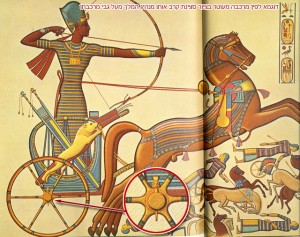Shabbat Parah is the third of the four special Shabbatot between Rosh Chodesh Adar and Roch Chodesh Nissan, a time of preparation for the Passover season. At the time of the Temple, Passover included an actual sacrifice that was brought and then eaten at the Seder, and in order to participate, one had to be ritually pure. Hence the custom to read Parshat Parah, which describes some of the laws of ritual purity, several weeks before Passover.
In addition to the connection to Passover, the date of Shabbat Parah is related also to Purim. The Gemara says,
ואי זו היא שבת שלישית – כל שסמוכה לפורים מאחריה
“Which is the third week? The one right after Purim.” (Megilla 30a).
It could just as easily have said, “the week before Shabbat Hachodesh”, which is how it actually comes out on the calendar. Phrasing it as “after Purim” implies that Shabbat Parah is connected to the events that happened after Purim, and not only to the upcoming Passover.
The Haftarah of Parshat Parah begins by describing the shame of exile:
וַיָּבוֹא אֶל הַגּוֹיִם אֲשֶׁר בָּאוּ שָׁם וַיְחַלְּלוּ אֶת שֵׁם קָדְשִׁי בֶּאֱמֹר לָהֶם עַם ה’ אֵלֶּה וּמֵאַרְצוֹ יָצָאוּ:
They came to the nations to which they had come, and they desecrated the Name of My holiness, when it was said about them, “This is the people of Hashem, and they have left His land.” (Yechezkel 36:20)
The prophet Yechezkel says explicitly that when the Jewish People are in exile, it is a “Chillul Hashem”, a desecration of G-d’s Name. It shows that we failed in our mission to further G-d’s plan for the world, and is an embarrassment to the Jewish People and to G-d Himself.
Why do we need to read this “after Purim”? Purim was a great miracle; the Jewish People narrowly escaped destruction. But when it was all over, they were still in exile. The Haftarah of Parah tells us that this is not good enough. We must not for a moment think that our salvation on Purim shows that living “spread out among the nations” is an acceptable state for the Nation of G-d.
On the other hand, if even Mordechai and Esther, with all the power that they wielded, were unable to end the exile, then perhaps it was just too hard. We know from the Books of Ezra and Nechemiah that life in the Land of Israel at that time was barely tolerable. The state of the economy, security, even religion itself, were all sub-par, certainly relative to the strong and vital community in Shushan. Given the problems that they were facing, they must have wondered if G-d was actually interested in them coming back. Perhaps they did not deserve to be redeemed.
The Haftarah of Parah tells us that G-d will not tolerate the shame of exile indefinitely, regardless of the relative merit of the Jewish People:
…לֹא לְמַעַנְכֶם אֲנִי עֹשֶׂה בֵּית יִשְׂרָאֵל כִּי אִם לְשֵׁם קָדְשִׁי אֲשֶׁר חִלַּלְתֶּם בַּגּוֹיִם אֲשֶׁר בָּאתֶם שָׁם:
…וְלָקַחְתִּי אֶתְכֶם מִן הַגּוֹיִם וְקִבַּצְתִּי אֶתְכֶם מִכָּל הָאֲרָצוֹת וְהֵבֵאתִי אֶתְכֶם אֶל אַדְמַתְכֶם:…וְזָרַקְתִּי עֲלֵיכֶם מַיִם טְהוֹרִים וּטְהַרְתֶּם…
… It is not for your sake that I do this, House of Israel, but for the sake of the Name of My holiness that you desecrated among the nations to which you had come.
… I will take you from the nations, and I will gather you from all the lands, and I will bring you to your land… I will sprinkle you with pure water and you will be purified (Yechezkel 36: 22-25)
When G-d chooses to do so, He will take the Jewish People out of exile and back to the Land of Israel. Once they are there, He will take steps to “purify” them, to make sure that they deserve to live in the Holy Land.
This appears to be illogical, out of order. It would make much more sense if the Haftarah first said, “I will purify you”, and then, “I will bring you to your land.”
This paradox is one of the lessons of Shabbat Parah. The section in the Torah that we read on this Shabbat describes the ritual of “Parah Adumah”: an unblemished red cow is slaughtered and burned, and its ashes are mixed with water to create a solution that is called “purifying water”. This solution is the only way to remove the ritual impurity caused by direct contact with death. Paradoxically, every person involved in the preparation of this “purifying water” becomes impure himself[1]. This law is not meant to be logical or understandable to human beings. To make this point, this commandment is introduced as an “חוקה”, a decree. As Rashi puts it:
גזירה היא מלפני ואין לך רשות להרהר אחריה
It is a decree before Me and you have no permission to second-guess it. (Rashi, Bamidbar 19:2)
According to the following Midrash, this is not only true of decrees that G-d made in the Torah, it is also true of decrees that He has made in history:
זאת חקת התורה זש”ה מי יתן טהור מטמא לא אחד (איוב יד) כגון אברהם מתרח חזקיה מאחז יאשיה מאמון מרדכי משמעי ישראל מעכו”ם העה”ב מן העה”ז מי עשה כן מי גזר כן מי צוה כן לא אחד לא יחידו של עולם … תמן תנינן כל העוסקין בפרה מתחלה ועד סוף מטמאין בגדים היא גופה מטהרת בגדים אלא אמר הקב”ה חקה חקקתי גזרה גזרתי ואין אתה רשאי לעבור על גזרתי.
As it says, “Who makes pure from the impure, not the one” (Job 14). E.g.: Avraham from Terach, Hizkiyahu from Ahaz, Yoshiahu from Amon, Mordechai from Shimi, Israel from pagan nations, the World To Come from the World As it Is. Who makes this happen, who decreed this, who commanded this? The One and Only … as we learned, “everyone involved in the red cow from beginning to end becomes impure, and it itself purifies.” G-d said, I wrote an edict, I decreed a decree, and you may not transgress My decree. (Bamidbar Rabba Chukat 19)
It would make a lot more sense to us humans if pure would come from pure. Avraham ought to have come directly from the righteous Noach, and not from ten generations of pagans. Israel ought to have come into being in purity and isolation in the Holy Land, not in the immoral filth of Egypt. The World To Come should have been created in the first place, not as an outcome of the World As Is.
But that is not how G-d chose to run the world. Just as the laws of Parah Adumah do not make sense to us, yet we accept is as a decree from Above, so, too, we must accept G-d’s choices in history as a decree from Above.
We might have expected the steps toward redemption to proceed in a logical order, that the Jewish People would first be purified and only then return to our land. We might have expected that the redemption would be led by the purest and holiest of the Jewish People. Yet the Haftarah of Shabbat Parah tells us otherwise. If G-d chooses, the converse can be true: first we return to our land, and only then we are purified. This might not make sense to us, it might not be how we would have done it, but it is a decree from Above, and we do not have the right to second-guess it.
On the first Shabbat between Purim and Passover, we prepare for national redemption, an end to the shame of Exile, no matter what form it takes.
Copyright © Kira Sirote
In memory of my father, Peter Rozenberg, z”l
לעילוי נשמת אבי מורי פנחס בן נתן נטע ז”ל



